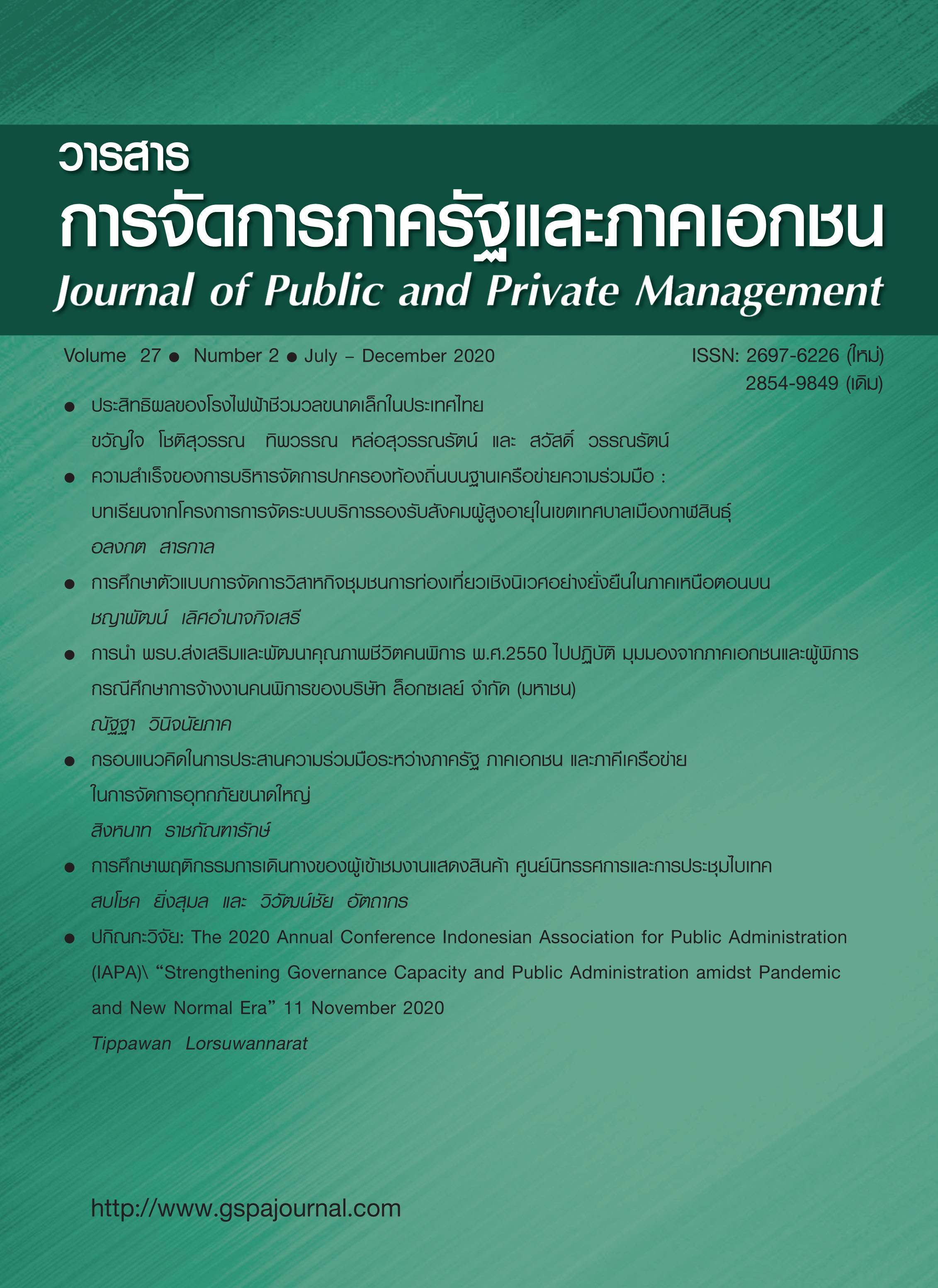Study on the Management Model for Sustainability of Ecotourism Enterprises in the Upper North of thailand
Abstract
Abstract
The objectives of this research were to study the management approaches of 12 ecotourism enterprises in the upper north of Thailand by focusing mainly on their knowledge management. The government’s roles in supporting and promoting the success of ecotourism enterprises were also explored. Considering the management approaches of the ecotourism enterprises, the researcher intended to place emphasis on the natural resources and environmental management, capital and labor, marketing and public relations, tourism activities, and network building. As for the knowledge management, the following six components were taken into account: knowledge collection, knowledge creation, knowledge storage, knowledge analysis, knowledge sharing, and knowledge application. The government’s role in supporting the ecotourism enterprises were also examined in terms of plans and policies, budget, training, and others. Moreover, the success of the ecotourism enterprises was evaluated in the economic (income), ecological, and cultural aspects.
Considering the management approaches of the ecotourism enterprises in aspects of natural resources and environmental management, the results suggested that all homestays enterprises in this study paid attention to the forest and natural resources conservation because forests played an important role in providing water, which is a basic human need. They conserved the forests and water by avoiding deforestation, occasionally growing trees, carrying out forest ordination events, constructing dams, and creating water reservoirs. When someone violated the forest conservation agreements, the community committee would take an action according to the law or community rules. In terms of labor and investment, the villagers joining in a homestay enterprise had to initially invest their own money and labor before the homestay fund was established. The homestay enterprises were found to gradually conduct the marketing management. The Department of Tourism helped promote their tourism activities on the official website of the Ministry of Tourism and Sports. The homestay enterprises were found to join and participate in the Northern Thailand Tourism Network, which was mainly driven by the Ministry of Tourism and Sports, the Department of Tourism, and the Tourism Council of Thailand.
Regarding the knowledge management, the homestay enterprises collected the knowledge from various sources, which included the research studies conducted within the homestays, trainings, seminars, success stories of other homestays, and knowledgeable consultants, who helped to solve their problems such as governmental officials, university teachers, and experts from private organizations and foundations. As for knowledge creation, it was found that they created their own knowledge using the knowledge obtained from their internal research studies, field trips to successful homestays, trainings, and seminars. The results suggested that the homestay enterprises rarely placed importance on knowledge storage. In terms of knowledge analysis, it was carried out in some research-based homestays, which were Mae Kampong Homestay, Nong Aab Chang Homestay, and Ban Sam Kha Homestay. The homestay enterprises shared their knowledge through advertising their community attractions, creating village communities, learning from other homestays, participating in trainings and seminars, collaborating with the government officials in monitoring the development progress of each homestay. After sharing and exchanging knowledge with other villagers in their community, they would determine appropriate guidelines for knowledge application.
The success of each homestay was assessed in the same way as a business unit was evaluated. The results showed that 6 out of 12 homestay enterprises were successful in terms of income and could continue to operate. In the ecological or environmental aspect, all homestay enterprises could properly maintain their community environment and were well aware of the negative effects of environmental ignorance. As for the aspect of cultural conservation, all homestay enterprises located in ethnic communities could preserve their traditional cultures and continue to carry out their tribal activities every year.
The governmental organization that had a direct duty to support the homestay enterprises was the Ministry of Tourism and Sports. It was responsible for determining related strategic plans and policies and played a role in carrying out the marketing and public relations activities for tourists. The Department of Tourism had technical responsibilities for issuing regulations, standards, and procedures associated with knowledge providing, training, assigning officials to give an advice to the homestay enterprises, evaluation and licensing process, and facilitating infrastructure development such as roads, electricity, and water supply. The previous plans and policies were mostly designed for tourism in general, which did not place importance on the ecotourism enterprises. In addition, the Department of Tourism also seemed to pay more attention to community-based tourism. Thus, there was a lack of concrete support to promote the ecotourism enterprises at the policy and implementation levels. The Department of Tourism was directly responsible for training and evaluating the homestays. Every homestay had to be trained and evaluated before receiving a homestay standard certification.
Based on the above results, the two management models for the ecotourism enterprises in the upper north of Thailand were proposed: 1) the holistic model and 2) the model required for sustainable development.
Keywords: Knowledge management, Management, Ecotourism enterprise, Government role



